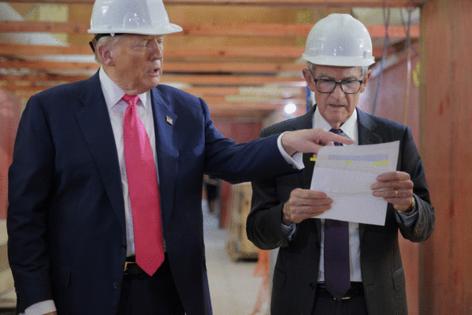Bill Dudley: The Fed's under siege. It'll be just fine
Published in Op Eds
In the media, the U.S. Federal Reserve is under siege. President Donald Trump constantly threatens to fire Chair Jerome Powell. Others hurl criticism in hopes of becoming Powell’s successor. Two Fed governors opposed last week’s decision to hold interest rates steady, the first multiple dissent since 1993.
Don’t be fooled by the drama. In terms of how the Fed manages the economy, it’s mostly a tempest in a teapot.
Trump has very little leverage over Powell. The Supreme Court has confirmed that the chair can’t be dismissed except “for cause” — a threshold that the renovation-cost overruns the president has cited don’t meet. Powell intends to serve out his term to May 2026 and possibly stay on further as a governor. He, not Trump, is in control of the Fed.
Whoever succeeds Powell might not obey Trump once in office. If pressed to lower interest rates in clear breach of the Fed’s mandate, the chair might refuse — and in any case would have to convince the policy-making committee. Trump probably can’t stack the FOMC: I’d be surprised if he gets the opportunity to appoint more than two or three members during this presidential term.
The double dissent from governors Michelle Bowman and Christopher Waller exaggerate the split within the Fed. All 19 members of the policy-making Federal Open Market Committee expect to cut interest rates over the next few years, according to their own economic projections from June. They differ only on timing and magnitude. The dissents should be discounted, given the “coincidence” that they’re from the only two Trump-appointed members.
The Fed chair’s sway over the FOMC is subtle and multi-faceted. The chair sets meeting agendas, chooses the topics (but not the conclusions) of the special staff analyses considered at meetings, sets committee assignments for the Federal Reserve Board and controls the Board’s staff resources. When monetary policy differences are modest, members have ample reason to stay on the chair’s good side. The more expertise and credibility the chair has, the more they’ll be willing to defer. During the dotcom boom of the 1990s, for example, they abided by Chairman Alan Greenspan’s judgment that productivity growth would keep inflation in check, because they trusted in his experience as an economic forecaster.
FOMC voters typically do not dissent over differences of timing and magnitude when they agree with the broad direction of monetary policy. More than one or two dissents tends to indicate significant disagreement and can threaten the chair’s influence both within the committee and beyond. Rarely would a Fed chair try to force a decision when strongly opposed by more than 2 or 3 members — though this depends on the motivations of the dissenters. I see last week’s dual dissents, for example, as a special case reflecting Waller’s desire to succeed Powell and Bowman’s “thank you” to Trump for appointing her as the Fed’s vice chair for supervision. I doubt they’ve diminished Powell’s standing.
I’ve been amply critical of the Fed — for its flawed 2020 monetary policy framework and for failing to properly consider the costs and benefits of quantitative easing, among other things. But I think the attacks from Powell’s potential successors go too far.
Accusations of mission creep overstate the evidence: The Fed’s climate change policy, for example, has remained entirely within its core financial-stability mission, focusing on how natural disasters might precipitate property losses and strand assets. The notion of “breaking some heads” to achieve “regime change” is downright mean-spirited, given the commitment of Fed officials and staff to do whatever is needed in terms of time, effort, and creativity to achieve the central bank’s objectives (a commitment that I witnessed as president of the New York Fed).
The Fed’s achievements in stabilizing markets during the 2008 financial crisis and the Covid pandemic, and in bringing down inflation while avoiding recession in recent years, deserve praise rather than disparagement. It’ll take a lot more than the latest wave of attacks to undermine the independence crucial to that record.
____
Want more Bloomberg Opinion? Terminal readers head to OPIN . Or you can subscribe to our daily newsletter.
This column reflects the personal views of the author and does not necessarily reflect the opinion of the editorial board or Bloomberg LP and its owners.
Bill Dudley is a Bloomberg Opinion columnist. A former president of the Federal Reserve Bank of New York, he is a nonexecutive director at Swiss Bank UBS and a member of Coinbase Global's advisory council.
©2025 Bloomberg L.P. Visit bloomberg.com/opinion. Distributed by Tribune Content Agency, LLC.

























































Comments